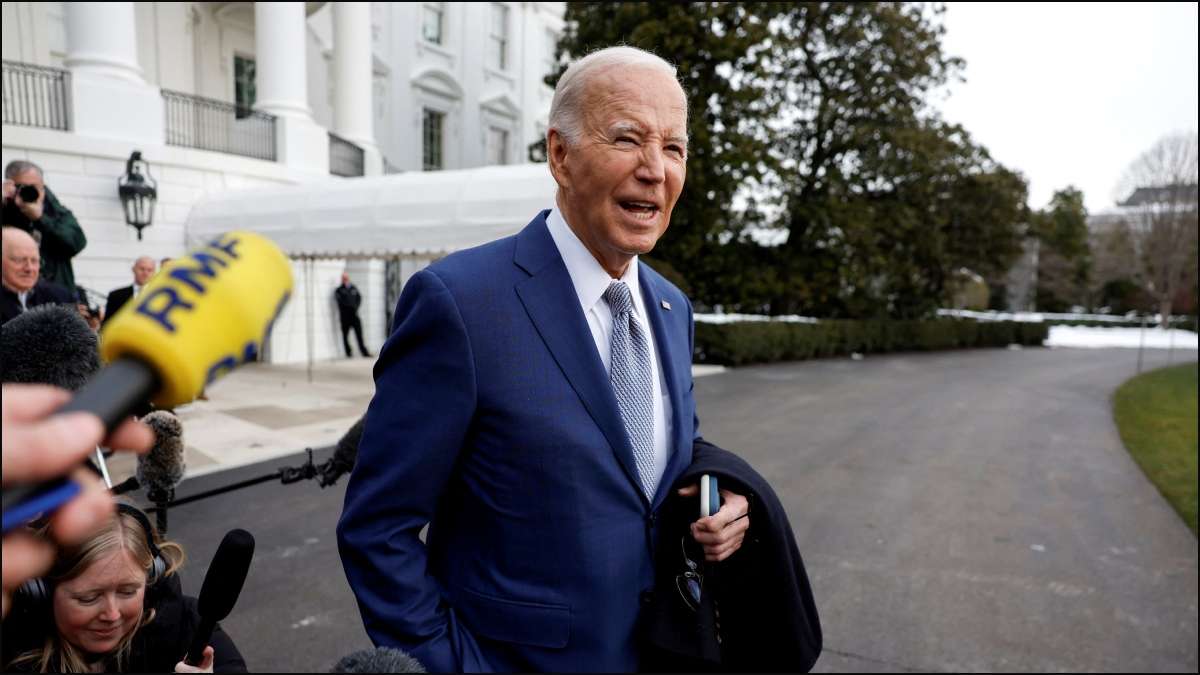
[ad_1]

The United States on Thursday called for calm as tensions between Iran and Pakistan reached a boiling point following the latter’s tit-for-tat strikes on Wednesday, two days after Tehran said it struck the bases of a terrorist group in Pakistan’s Balochistan province. US President Joe Biden remarked that the clashes show that Iran is not ‘well-liked’ in the region.
Pakistan said on Thursday it had carried out precision against separatist militants in Iran using killer drones, rockets, loitering munitions and stand-off weapons that struck “terrorist” groups Balochistan Liberation Army and the Balochistan Liberation Front. Pakistan said maximum care was taken to avoid collateral damage and urged “dialogue and cooperation” in resolving issues between the two “brotherly countries.” Pakistan’s strikes killed at least nine people, including women and children.
“As you can see Iran is not particularly well-liked in the region and where that goes, we’re working on now. I don’t know where that goes,” Biden told reporters before departing the White House on Thursday. Meanwhile, the White House said Washington is monitoring the Iran-Pakistan clashes closely.
“We don’t want to see an escalation clearly in South and Central Asia. And we’re in touch with our Pakistani counterparts,” said White House national security spokesperson John Kirby. He said the attack on Pakistan was another example of Iran’s destabilizing behavior in the region.
Iran’s response to Pakistan’s attacks
The Iranian Ministry of Foreign Affairs has condemned Pakistan’s drone attack on non-Iranian villagers on the border of the two nations, calling it “unbalanced and unacceptable”. It asserted that Tehran adheres to the policy of “good neighbourliness and brotherhood” between the two countries and expects the Pakistan government to adhere to its obligations in preventing the establishment of bases and deployment of terrorist groups on its soil.
Confirming Thursday’s strikes, Pakistan’s Ministry of Foreign Affairs said it undertook “a series of highly coordinated and specifically targeted precision military strikes” against “Pakistan-origin terrorists” in Iran’s Sistan-o-Baluchistan as part of ‘Operation Marg Bar Sarmachar’.
“This morning, Pakistan undertook a series of highly coordinated and specifically targeted precision military strikes against terrorist hideouts in the Siestan-o-Baluchistan province of Iran. A number of terrorists were killed during the Intelligence-based operation – codenamed ‘Marg Bar Sarmachar’. Over the last several years, in our engagements with Iran, Pakistan has consistently shared its serious concerns about the safe havens and sanctuaries enjoyed by Pakistani-origin terrorists calling themselves Sarmachars on the ungoverned spaces inside Iran… However, because of a lack of action on our serious concerns, these so-called Sarmachars continued to spill the blood of innocent Pakistanis with impunity,” said Pakistan’s Foreign Ministry.
The Iranian news agency, IRNA, reported that the missile and drone hit a village in the city of Saravan, killing at least nine people. Iranian Interior Minister Ahmad Vahidi claimed all the dead “were foreign nationals”. According to a statement issued by the military’s media affairs wing, “hideouts used by terrorist organisations namely Balochistan Liberation Army (BLA) and Balochistan Liberation Front (BLF)” were struck in an intelligence-based operation.
The statement from Tehran came a day after Iran launched massive attacks targeting what it described as bases inside Pakistan for the militant group Jaish al-Adl–a Sunni militant group that largely operates across the border in nuclear-armed Pakistan. Islamabad strongly condemned the attack as “an unprovoked and blatant breach” of Pakistan’s sovereignty, expelling the Iranian ambassador and recalling its envoy from Iran.
Tensions between Iran and Pakistan
Iran and Pakistan share a 900-kilometer (560-mile), largely lawless border in which smugglers and militants freely pass between the two nations. The route is also key to global opium shipments coming out of Afghanistan. For both countries, the cross-border attacks renew questions about the preparedness of their own militaries, particularly their radar and air defense systems.
Ethnic Baloch militants have battled the government for decades for a separate state, saying the central government unfairly exploits the province’s rich gas and mineral resources of Balochistan province, which borders Afghanistan and Iran. The BLF is among the insurgents who often target gas projects, infrastructure and security posts there, but have begun launching attacks in other parts of Pakistan.
On the other hand, Jaish al-Adl, or Army of Justice, is a separatist militant group that operates on both sides of the border and has previously claimed responsibility for attacks against Iranian targets. Its stated goal is the independence of Iran’s Sistan and Baluchistan province, which neighbours Pakistan.
Tehran has been experiencing growing pressure for some kind of action after a deadly Islamic State group attack earlier this month, Israel’s war on Iran’s ally, Hamas, and wider unrest against its theocracy. However, the airstrikes could backfire on Pakistan because the Baluch Liberation Army said it will avenge the killings and wage war on the state.
(with inputs from agencies)
ALSO READ | What is Baloch Liberation Front which Pakistan targeted in airstrikes in Iran’s Sistan-Baluchestan province
[ad_2]
Source link